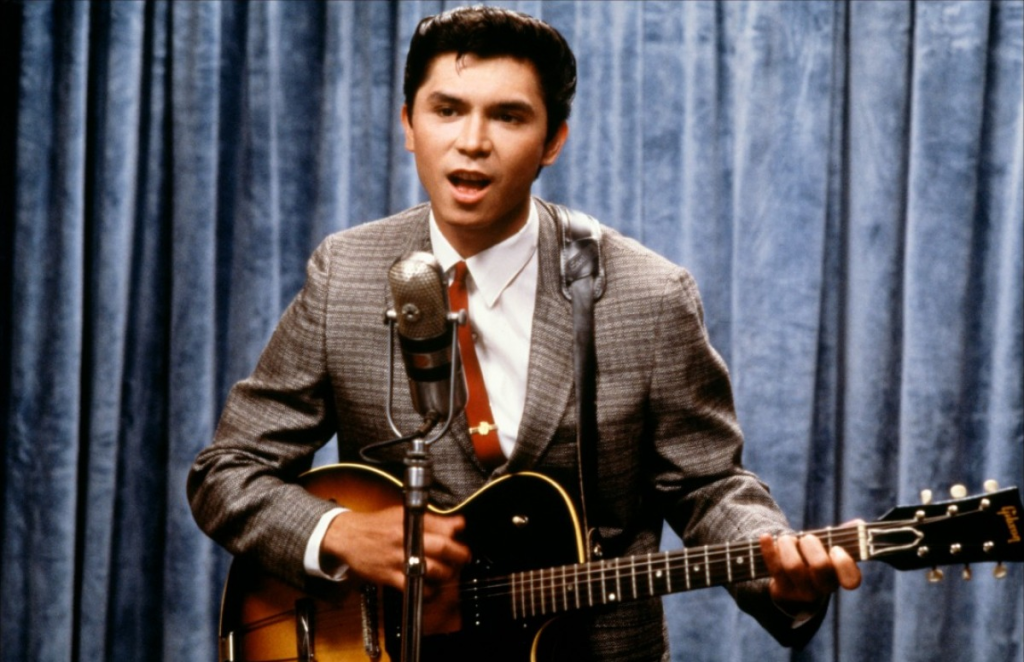In 1987, La Bamba hit theaters, telling the inspiring yet heartbreaking story of Ritchie Valens, a 17-year-old music sensation whose life was tragically cut short. Directed by Luis Valdez, the film was not just a biopic—it was a powerful tribute to Chicano culture, an exploration of identity, and a reflection on the struggles of Mexican-Americans in the U.S. Decades later, La Bamba remains a cultural landmark, continuing to captivate audiences with its emotional storytelling and unforgettable music.
California in the 1980s: A Changing Cultural Landscape

When La Bamba premiered in 1987, California was undergoing significant social and economic changes. The divide between the wealthy and working-class communities had widened, and Mexican-Americans continued to face systemic challenges in education, employment, and representation in the media. Despite these obstacles, Chicano culture was experiencing a resurgence, with artists, activists, and filmmakers pushing for visibility and change.
Luis Valdez, a trailblazer in Chicano theater and cinema, was at the forefront of this movement. Born into a family of migrant laborers, he had already gained recognition for his work with El Teatro Campesino, a theater group dedicated to social justice. With La Bamba, Valdez brought his vision to the big screen, creating a film that honored Mexican-American heritage while shedding light on the struggles faced by the community.
Ritchie Valens: A Story of Talent, Dreams, and Tragedy
Ritchie Valens, born Richard Steven Valenzuela, was a young man with an extraordinary gift. Raised in a working-class Mexican-American family in California, he developed a passion for music at an early age. His ability to blend traditional Mexican folk sounds with rock ‘n’ roll made him a pioneer of Chicano rock.
By the time he was 17, Valens had already achieved fame with hits like Donna and La Bamba, a rock adaptation of a traditional Mexican song that became an international sensation. However, his meteoric rise was tragically cut short on February 3, 1959, when he died in a plane crash alongside Buddy Holly and J.P. “The Big Bopper” Richardson. This devastating event became known as The Day the Music Died, marking a pivotal moment in rock history.
Bringing Ritchie’s Story to Life: The Making of La Bamba
La Bamba was a passion project for Luis Valdez, who wanted to tell Ritchie Valens’ story with authenticity and depth. The film didn’t just focus on Valens’ music career—it also explored his family dynamics, struggles with fame, and the complex relationship with his half-brother, Bob Morales.
The film’s success was largely due to its outstanding cast, particularly Lou Diamond Phillips, who delivered a breakout performance as Ritchie Valens. Esai Morales, playing the troubled yet charismatic Bob Morales, also gave a powerful and emotional performance, adding another layer of realism to the film.
Lou Diamond Phillips: A Controversial Yet Iconic Casting Choice

One of the biggest casting debates surrounding La Bamba was the decision to cast Lou Diamond Phillips, a Filipino-American actor, in the role of Ritchie Valens. While some criticized the choice, Phillips won over audiences and critics alike with his dedication to the role.
To prepare for the film, Phillips studied guitar, mimicked Valens’ stage presence, and fully immersed himself in the character. While he didn’t perform the vocals—those were provided by David Hidalgo of Los Lobos—his performance was so convincing that many viewers believed he was actually singing.
Reflecting on the film years later, Phillips acknowledged its lasting impact: “La Bamba wasn’t just a movie—it was a movement. It opened doors for more representation in Hollywood and showed the world the importance of Ritchie Valens’ legacy.”
Esai Morales: The Unsung Hero of La Bamba

While Lou Diamond Phillips’ performance as Ritchie Valens was widely celebrated, Esai Morales delivered an equally compelling portrayal of Bob Morales. The film depicted Bob as a troubled yet deeply loving older brother, struggling with personal demons while watching Ritchie achieve the kind of success he had always dreamed of.
Morales’ performance gave the film emotional weight, turning Bob into a symbol of the struggles faced by many Mexican-Americans at the time. Despite his powerful portrayal, Morales didn’t receive the mainstream recognition he deserved. However, over the years, his performance has gained appreciation, with many fans considering it one of the film’s most memorable aspects.
The Day the Music Died: A Heartbreaking Turning Point
The most emotional moment in La Bamba comes when Ritchie Valens wins a fateful coin toss, securing him a seat on the ill-fated plane that crashed on February 3, 1959. This moment wasn’t a dramatic invention—it really happened.
The tragic accident claimed the lives of three rising music stars, marking a profound loss for the industry. Valens, who had been a star for less than a year, had already changed the landscape of rock music. His death became a symbol of unrealized potential, and his story continues to resonate with fans today.
Chicano Culture: The Heart and Soul of La Bamba

Beyond Ritchie Valens’ story, La Bamba was a love letter to Chicano culture. The film highlighted the experiences of Mexican-American families, the challenges of assimilation, and the importance of community.
In the 1980s, representation of Latinos in Hollywood was still limited, making La Bamba a groundbreaking film. It showcased the vibrancy of Mexican-American life, from family gatherings to cultural traditions, while also addressing issues like racial discrimination and class struggles.
The film’s success helped pave the way for more Latino-driven stories in cinema and inspired a new generation of filmmakers to tell their own stories.
The Music That Defined an Era
At its core, La Bamba is a celebration of Ritchie Valens’ music. His songs, filled with youthful energy and heartfelt emotion, continue to resonate across generations.
The film’s soundtrack, recorded by Los Lobos, became a massive success, with their rendition of La Bamba topping the charts. Their faithful recreations of Valens’ hits helped introduce his music to a new audience, ensuring that his legacy lived on.
Even today, La Bamba remains an anthem, symbolizing cultural pride and the power of music to transcend barriers.
A Legacy That Stands the Test of Time

More than three decades after its release, La Bamba remains a cultural touchstone. It was more than just a film—it was a statement about identity, perseverance, and the enduring impact of a young musician who left the world too soon.
With its heartfelt storytelling, unforgettable performances, and powerful message, La Bamba continues to inspire new generations. Whether you watch it for its incredible music, its compelling characters, or its celebration of Chicano heritage, one thing is certain—Ritchie Valens’ spirit lives on through this timeless classic.


